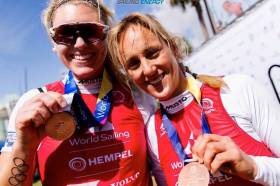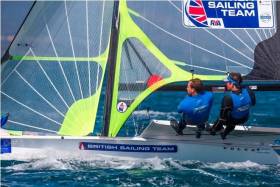Displaying items by tag: Team GB
Sailors Vita Heathcote and Chris Grube will compete for Team GB in the mixed dinghy class at the Paris 2024 Olympic Games, the British Olympic Association has announced.
Heathcote will be the youngest sailor in the Team GB line-up aged just 22, while Grube, 39, will make his third appearance for Team GB having competed at Rio 2016 and Tokyo 2020 with Luke Patience.
The pair only joined forces eight months ago, but last month, they scooped a silver medal at the 470 class World Championship in Palma, Mallorca, securing a quota place for Team GB and earning themselves athlete selection.
Heathcote, from Lymington, Hants, is a rising star of the British Sailing Team, joining in 2020 at the age of 18.
She was world champion in the 420 class, the youth version of the 470, the previous year and has since scooped a European bronze medal as well as the recent World Championship silver.
The Olympic legacy also runs strong in Heathcote’s family – her uncle is three-time Olympic sailor Nick Rogers, who won silver medals in the 470 class at Athens and Beijing.
“It gives me goosebumps knowing that I’m going to be a part of the biggest sporting spectacle on earth,” said Heathcote.
“The Olympics has always been the goal and the thing I project my inspiration and motivation towards, so selection is a box ticked on the way there.
“I feel like now I can really sink my teeth into that event and the progress up to it - it is a very freeing and unique sensation.”
Heathcote will have big shoes to fill, picking up the mantle from Tokyo 2020 gold medallists Hannah Mills and Eilidh McIntyre.
The GB sailors selected for Paris 2024 are:
- John Gimson and Anna Burnet – Mixed Multihull (Nacra 17)
- James Peters and Fynn Sterritt – Men’s Skiff (49er)
- Freya Black and Saskia Tidey – Women’s Skiff (49erFX)
- Emma Wilson – Women’s Windsurfing (iQFOiL)
- Sam Sills – Men’s Windsurfing (iQFOiL)
- Ellie Aldridge – Women’s Kite (Formula Kite)
- Michael Beckett – Men’s Dinghy (ILCA 7)
- Hannah Snellgrove – Women’s Dinghy (ILCA 6)
- Vita Heathcote and Chris Grube – Mixed Dinghy (470)
The Royal Irish Yacht Club’s Saskia Tidey and her Team GB sailing partner Charlotte Dobson have launched a crowdfunding campaign to support their efforts to qualify for the 49erFX class in next summer’s Olympic Games in Tokyo.
The pair, who finished seventh among a strong field of contender at the 49erFX Europeans last month, say they have reached a “hurdle” in their present fundraising efforts.
“The level of financial backing we have needed to maintain podium positions has now exceeded beyond what our campaign budget is capable of.”
But with additional backing, they say, “we absolutely believe we can complete and deliver the training programme we have planned to bring home a medal”.
Saskia and Charlotte have set a £5,000 of which they have raised nearly a quarter in less than a week.
For more on the pair’s campaign, see their GoFundMe page HERE.
Read the pair’s full appeal below:
We are Olympians Saskia Tidey & Charlotte Dobson. Team mates onboard our 49er FX Olympic class skiff dinghy representing Great Britain on the British Sailing team. We need your help!
After the Rio 2016 Olympic games concluded we left with fire in our bellies and our eyes and hearts set on the goal to medal at the Tokyo 2020 Olympic Games in Japan.
For three years we have battled on the International World Sailing circuit to bring home medal winning performances for Great Britain. It has been a honour to fly the flag and and a privilege to be under the pressure of striving for greatness.
Unfortunately we have reached a hurdle in our campaign which we are finding increasingly difficult to jump. The level of financial backing we have needed to maintain podium positions has now exceeded beyond what our campaign budget is capable of. With additional funds we absolutely believe we can complete and deliver the training programme we have planned to bring home a medal.
This summer we will represent Great Britain at the 2019 Olympic Test event in Japan. Please follow our journey and donate before August 2019 to help us reach the gold standard program we need to continue to succeed!
With Tokyo 2020 just around the corner we are seeking help and support from anyone would would like to join our journey and help us keep on the podium for Great Britain in 2020!
Sailing is a sport that can be overlooked and misunderstood but it is an exhilarating sport which is accessible to everyone and we would love to entice more viewers to enjoy it too!
Please help us on on our journey!
Follow our story on Instagram @gbr_44fx
Help Spread the word!
Charlotte & Saskia xox
Just as Ireland named Finn Lynch as its last sailor for Rio yesterday, the final four sailors who will take to the water for Team GB at the Rio 2016 Olympic Games have were announced by the British Olympic Association (BOA).
Luke Patience and Chris Grube will compete in the men's 470, while Dylan Fletcher and Alain Sign complete the squad in the 49er after a close British selection battle.
For Fletcher, Sign and Grube, Rio 2016 will be their first Olympic outing, with Grube having teamed up with Patience following Elliot Willis's cancer diagnosis at the end of 2015. Patience already has an Olympic medal to his name - a 470 silver he picked up with Stuart Bithell at London 2012.
The first group of sailors was announced back in September with further names being added in March and today's announcement completes the 15-strong sailing line-up that will head to Rio 2016.
Team GB lead the way in sailing at the Olympic Games and sit atop the overall standings with 55 medals accrued since 1986 - including 26 golds.
The four sailors selected today are:
Luke Patience, 29 (Men's 470)
Chris Grube, 31 (Men's 470)
Dylan Fletcher, 28 (49er)
Alain Sign, 30 (49er)
Those previously selected are:
Giles Scott (Finn)
Nick Thompson (Laser)
Alison Young (Laser Radial)
Bryony Shaw (Women's RS:X)
Nick Dempsey (Men's RS:X)
Hannah Mills (Women's 470)
Saskia Clark (Women's 470)
Charlotte Dobson (49erFX)
Sophie Ainsworth (49erFX)
Ben Saxton (Nacra 17)
Nicola Groves (Nacra 17)
First British Sailors Selected For Rio 2016 Olympic Games
The British Olympic Association (BOA) has announced the names of the very first athletes to officially join Team GB for the Rio 2016 Olympic Games.
A total of eight athletes have been selected across six of the ten sailing events, who between them have won four Olympic medals and seven World Championship golds.
Giles Scott's is the first name to appear on the Rio teamsheet, with the 28-year-old, unbeaten in almost two years, set to make his Olympic debut in the Finn class.
Happy have been selected to represent @TeamGB for #Rio2016. 1 year out and plenty of work to do!!
— Giles Scott (@GilesScott) September 9, 2015London 2012 silver medallists Hannah Mills and Saskia Clark are paired together again in the 470 Women's class while Luke Patience, who also won silver three years ago, teams up with two-time World Champion Elliot Willis in the 470 Men's event.
Bryony Shaw, who became Britain's first female Olympic medal-winning windsurfer with bronze at Beijing 2008, is set to contest her third Olympic Games next year in the RS:X Women's event.
London 2012 Olympian Alison Young returns in the Laser Radial while 2015 Laser World Champion Nick Thompson earns his first Olympic appearance to round off the first wave of sailing selections for Rio.
British sailors have won 55 medals - including 26 golds - since sailing made its debut at Paris 1900 with Team GB topping the overall Olympic sailing medal table.
Trials for the Irish Olympic team get underway in the mens and women's Laser class this Winter.






























































